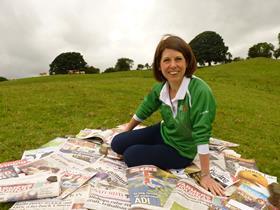
What was the inspiration behind Just Farmers?
Anna Jones: I started working on Countryfile as a researcher in 2006, and when it moved to having a more broad appeal, I started to notice a prickly relationship between the media and farmers emerge. Some farmers used to call it “townie-file” and that really frustrated me. I thought we were doing a good job, covering issues that no one else was. Journalists would say they felt farmers were defensive, and could be sanctimonious about producing food. They were getting annoyed and farmers were getting annoyed and I was stuck in the middle of it.
Was there a moment when the idea fell into place?
AJ: When I was doing my Nuffield Scholarship I spent two years travelling around the world, examining the relationship between farming and the media. I found tensions between media and farmers runs right through the western developed world, from the US to Denmark and Ireland. The only place where they didn’t have it was Kenya, where three quarters of the country work in agriculture.
It wasn’t until my last research trip to France when I saw something similar with the dairy sector, called the ‘farmer witness network’. They were an ordinary group of farmers formed after the foot and mouth crisis, and had media training on how to be yourself in front camera for example.
So how does it work?
AJ: I’m trying to build an independent group of farmers. I want to give them the confidence to talk openly to the media through two tailored media education workshops, which each last a day and a half. After that they’ll join a secure online database where journalists and programme makers can log on to access their contact details. If the farmers or growers do get a phone call from a journalist, they will be expect- ed to answer their questions and help them out. That’s the commitment ‘Just Farmers’ make.
Do the media need training in how to better cover agriculture?
AJ: I think journalists definitely have to work on their game and should challenge their own practises. I’ve seen some journalists make wild and toe-curling assumptions they wouldn’t make about other industries. Journalists in the city will have a network of teachers and nurses, for example, to go to for a story, but how many farmers will they know? Often none.
You’ve said that agriculture has been affected by “politically charged” times. What do you mean by that?
AJ: I’ve really noticed how farming and agriculture has become bigger news recently. It’s got more and more headlines, and the Brexit vote means journalists are looking at which are the most exposed industries and agriculture is one of them. Agriculture has become really relevant especially with Michael Gove as Defra secretary, having been one of the Brexit campaign leaders. With that extra scrutiny and that extra industry attention we have got to make sure farmers are match-fit for press and media attention.






No comments yet